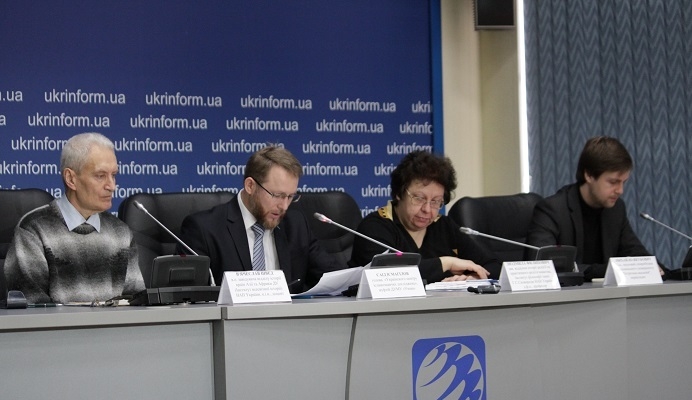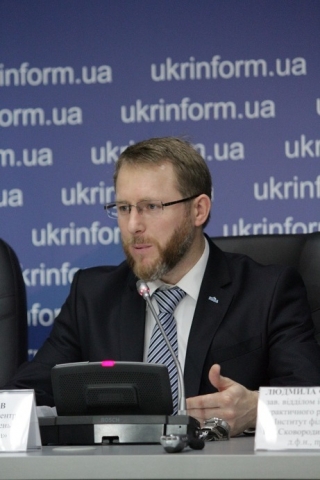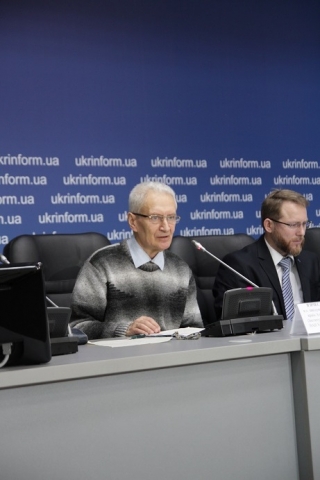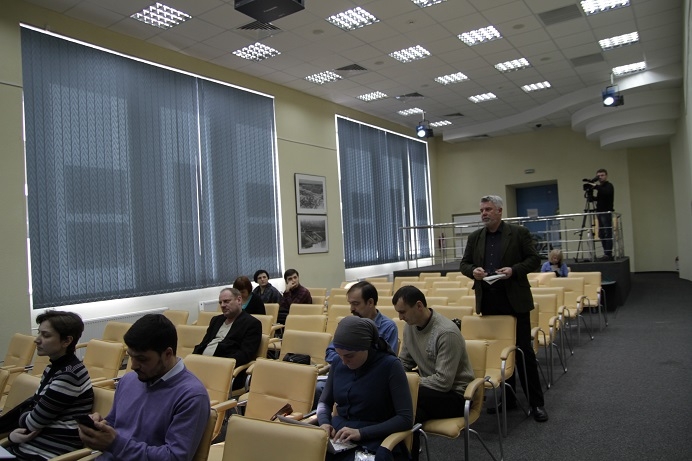It’s odds-on that Ukraine will present a new model of Muslim-Christian relations to the world, in case we preserve the groundwork of past 20 years in order to make Ukrainian Muslim Community’s development high-quality and dynamic. Dedicated to modern Islam in our country and its further perspectives, a press-conference “Transformational Processes In Ukrainian Muslim Community” was held on February 23 at “”UkrInform” Conference-Hall.
Ms.Liudmila Filipovych, PhD, Professor and Head of Department of History And Practical Religious Studies at NAS H.Skovoroda Philosophy Institute, moderated the event. She not only coordinated the speakers, but gave the visitors every opportunity to ask their questions and receive extended answers.
Mr.Said Ismagilov, Head of “Ukrainian Centre of Islamic Studies” and Mufti at RAMU “Umma”, spoke about results of statistical study, held just before the tumultuous times started. Those results were quite interesting: although 54% of Ukrainians weren’t ready to welcome a Muslim President, most of the respondents would eagerly vote for a Muslim Mayor, Minister or MP granted one had a good action plan. Only 16% would be against erecting a mosque in their settlement; the rest either endorsed the idea or said they had no objections, and 13% answered they already had a mosque in their settlement.
Residents of rural areas of Central and Western Ukraine were the least enlightened on Islam and Muslims, while urban citizens along with residents of Eastern and Southern Ukraine had at least general idea of the subject.
The Mufti noted that he wants to hold another research this spring in order to study the dynamic of public opinion. There’s a firm ground for presuming that there have been changes in public opinion. On the one hand, the whole country learned about the tragedy of Crimean Tatars and observed another tragedy befalling on those people, who were the last to defent everything Ukrainian on the peninsula: not only they went to different meetings, spread information, drawing the world’s attention to the danger coming from “polite green men”, but also were one of the first volunteers who started providing the blocked Ukrainian army troops with food supplies at their own cost. The whole country witnessed persecutions the Crimean Tatars faced after the annexation; many people invited them to move to their homes, helped them to settle in. The migrants mostly headed for those regions where local people knew almost nothing about Islam and Muslims. On the other hand, there have been negative world tendencies around Muslims, such as attack at “Charlie Hebdo”, military atrocities by so-called ISIS in the Middle East. These can, on the contrary, increase negative speculations and stereotypes about perception of Muslims by people of other religious views. We have two opposite tendencies, and it’d be interesting to see which of them was the strongest.
Dr.Vyacheslav Shved, leading researcher of the Institute for World Economy and International Relations of the National Academy of Sciences (NAS) of Ukraine, acting Director of the Dept. of Near East Affairs at Ukraine's National Institute for Strategic Studies, spoke about the latest events in Muslim countries and their possible impact on Ukraine. He noted that that Arab countries are our allies not only in the matters of our economy’s urgent rescue in terms of finding other markets instead of Russian, but also important military allies, as Saudi monarchy has preexisting grudge for Russia who interfered and didn’t let them finish Asad.
Many sectors of Ukrainian economy have profound perspectives in the Middle East, such as agricultural sector (grains, meat, milk, poultry), technical and logistics sector. For that reason, a memo has been sent to the Government stressing the urgency of changing Ukrainian-Saudi relations to the level of strategic partnership. This country controls Organisation of Islamic Cooperation (OIC), which is a sort of “Muslim UN” and can promote gaining the observer country status for Ukraine, which Russia once gained. This would open access to the new markets of Muslim countries.
Mr.Mykhailo Yakubovych, research officer at NAtional University “Ostroh Academy” with PhD degree in history and the first person to translate the meanings of the Qur’an to Ukrainian, made thorough analysis of the impact the events of 2014 had on Ukrainian Muslim community. In his opinion, history of Ukrainian Muslim communities must be divided in two periods.
Muslims are the religious community most influenced by the events in Crimea and Donbass for the reason that those were the regions of their compact settlement.
Since early 2014, one can speak of Ukrainian Islam in three realities, which are Ukrainian, Russian and mixed.
About 20 000 Crimean Tatars were forced to leave Crimea after annexation; about 50% Muslims left Donbass.
Religious Administration of Muslims of Crimea was Ukraine’s largest Muslim organisation that found itself in the limelight after Russia annexed Crimea. THe smaller religious organisations left the peninsula, while Mr.Emirali Ablaev’s organisation found itself in the middle of conflict between Russian Muslim organisations, with each of them willing to involve RAMC to its structure or at least to its orbit. At the moment, RAMC maintains independence, but it’s obvious that sooner or later it will be forced to join some larger organisation, as Crimean becomes more and more integrated to Russia each day.
In Donbass, alternative religious administrations are being created, as all-Ukrainian Muslim religious organisations have problems with logistics and communication with this occupied region. SOme part of local Muslims had certain sympathies for separatists, and it remains unknown whether they got dissapointed. Perhaps a new RAM will be created on the pattern of Russian equivalents, as other models are inviable in Russia.
Muslim migration to other regions activates social-political processes there and can be a kind of challenge for local administrations, as those regions have little experience of accommodating followers of Islam which can cause some sort of tension. It’s obvious that the first steps have to be taken immediately while the Media shows positive image of Ukrainian Muslims, which promotes establishing positive cooperation.
Changes within Muslim communities launched the process of forming Ukrainian Islam, for there has been none in the period of 1944 up to 1989, officially there were no Muslims in Ukrainian SSR after Crimean tatars were deported. For that reason, history of Ukrainian Islam is intimately connected with the history of Independent Ukraine. The first stage was over in about 2011 when all the main structures have been formed and they started developing cooperation ties with other religious communities, local administrations and State authorities. Researchers predicted their further quality development.
Now new structures are being formed, besides, there can be new division between Muslims based on their attitude to what happened in Ukraine, in Crimea and Donbass. The power landscape now is just about this: RAMC that declared its pro-Ukrainian position first, was forced to stay neutral, RAMU of Shaikh Ahmed Tamim never declared its position, RAMU “Umma” has always had a clear and consistent pro-Ukrainian position; Hizb-ut-Tahrir doesn’t approve the recent changes in Ukraine and Maidan itself, calling them “fitna”, but nevertheless they left Crimea for Western Ukraine in search for religious freedoms they wouldn’t have in Russia.
The time is ripe for creating a single powerful centre of Islamic research in Ukraine in order to preserve the best practice for the past 20 years. If this isn’t done within a year or so, Crimean Muslims will be more and more lost for us each day, as they live under fierce pressure of Russian policy towards Muslims and have to adapt to Russian reality day by day.
Answering a question whether he thinks Islam and democracy are compatible, Mr.Yakubovych said that he was sure it was in Ukrainian realities. The researcher noted that general answer to this question largely depends on who speaks in the name of Islam and who speaks in the name of democracy. Ukraine is one of the countries with the highest level of religious freedom in the world, and Ukrainian Muslims associate themselves with Ukraine, not with some mythical Caliphates. And we can see that in action: Muslims do their activities, and the state doesn’t interfere in their internal affairs.
Besides, Ukrainian Muslims are well-integrated in the society just because they are mostly local people, tied emotionally to the land of their ancestors, and have direct interest in developing peace and welfare in Ukraine. During many ages of common history, different religious communities of Ukraine learned to get along and have respect for each other, and for that reason Ukraine indeed has every chance to present a new model of Muslim-Christian relations to the world, in case we preserve the groundwork of past 20 years.
Ms.Filipovych added that she is sure in capacity of Ukrainian Muslim community to be positive environment for presenting new strong, gifted and interesting personalities who will take seat among both Ukrainian and world in-companies.






